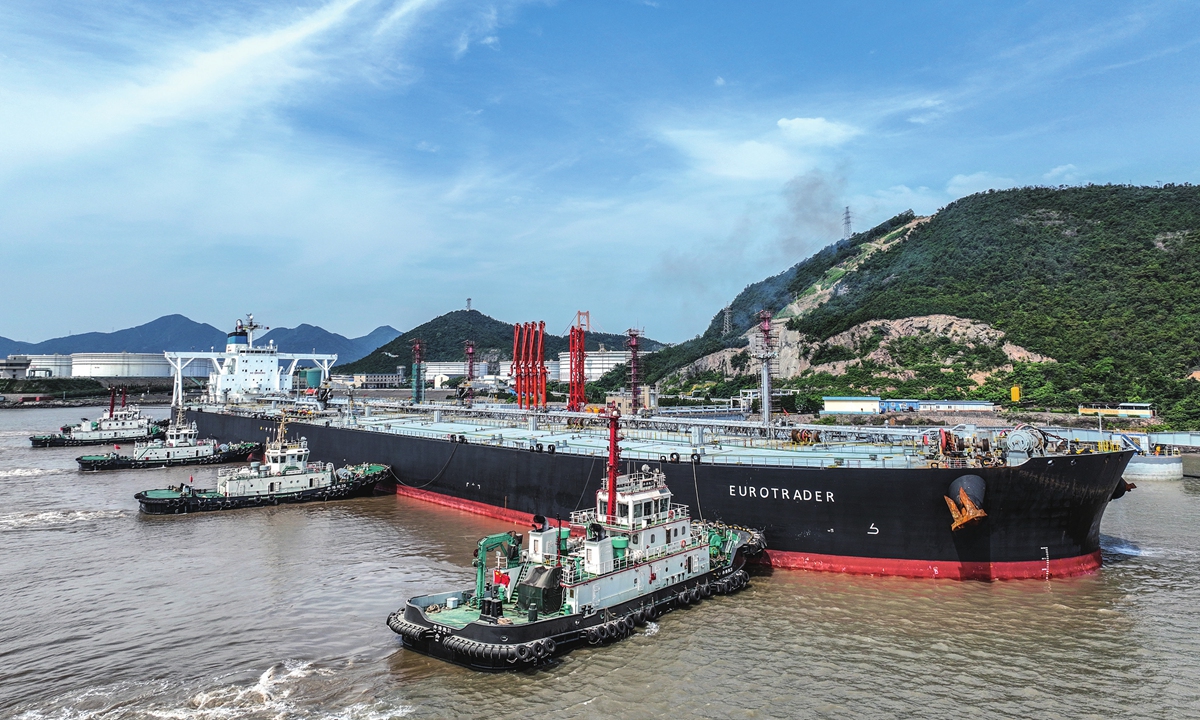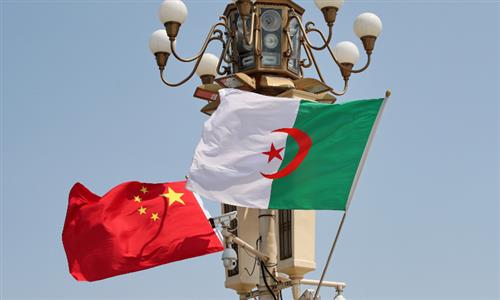
A 300,000-ton tanker docks at Ningbo Zhoushan Port on July 13, 2023. Photo: VCG
Ports both domestic and overseas are calling for closer collaboration under the China-proposed Belt and Road Initiative (BRI), which marks its 10th anniversary this year. They made the call at an annual industry forum in Ningbo, the prominent nexus of transport and logistics in East China's Zhejiang Province, as they embark on a new journey to tackle global challenges such as inflation, economic slowdown and geopolitical uncertainty.
Industry analysts said that the joint initiative will provide a gateway for enhanced ports cooperation and connectivity. It encompasses various sectors including infrastructure, trade and investment.
By leveraging these opportunities through closer partnership, ports will be able to navigate the complexities of the global economic headwinds, propelling mutual development and prosperity.
On the sidelines of the 7th Maritime Silk Road Port International Cooperation Forum in Ningbo, domestic port operators and their overseas counterparts reached consensus to strengthen partnerships in order to address common challenges.
Profound changes
Speaking as the eyewitness of the changing international trade situation, Mao Jianhong, chairman of Zhejiang Seaport Group and Ningbo Zhoushan Port Group, told the Global Times at the forum that "the foreign trade situation has indeed undergone profound changes compared to previous years."
Mao said that his port group will further expand its global footprint, which includes establishing overseas warehouses and extending business operations to the countries and regions under the BRI. The exploration will help mitigate the negative impacts of global trade market volatilities.
This year, the global economic recovery has been weak, and the major economies have tightened their monetary policies to curb inflation, exacerbating the contraction of global demand, and casting shadows on the development of world trade.
Efforts have already been made in expanding core port businesses abroad under the initiative. One good example is the signing of a memorandum of understanding on cooperation between Zhejiang Seaport Group & Ningbo Zhoushan Port Group and DP World in Jafza, a DP World-owned free trade zone based in Dubai, United Arab Emirates, in May.
As the company's latest BRI project, it will promote comprehensive strategic cooperation in the vehicle logistics business.
The port company is also expanding shipping lines along the BRI routes. So far, BRI-related shipping routes of the Ningbo Zhoushan Port have reached 125 lines, an increase of 71.2 percent compared to 2013, the Global Times learned from the company.
Growing shipping lines
Overseas ports are also seeking to build enhanced connections with China and other countries under the BRI.
Lars Anke, chief representative of Hamburger Hafen und Logistik AG, a leading European logistics company based in Hamburg, said that the BRI could be the bridge for the stronger connectivity and cooperation that the port industry needs more than ever in dealing with global challenges such as inflation and geopolitics.
"We operate terminals mainly in Hamburg and other European ports...therefore the interconnection of logistics, as it is also the aim of the BRI, is something that is important for us," Anke told the Global Times.
"The joint initiative complements our ideas and strategies that we have in Europe and Germany. Again, it's very important to work together," the German business representative said.
Jan Van der Borght, representative of Port of Antwerp Bruges in Belgium, who is also economic affairs advisor of the Embassy of Belgium in China, shared with the Global Times his concern that geopolitical tensions, including those between the US and China, may "slow the economic recovery process and make things more complicated."
Given this circumstance, Borght said that the BRI is of great importance, for it brings about collaboration.
Eranda Kotelawala, CEO of the Solomon Islands Ports Authority, told the Global Times that the authority embraces the win-win situation and vast opportunities of cross-border cooperation among many ports under the BRI.
Gateway for trade
"This collaboration improves business and is basically a shared vision for everyone," Kotelawala said, noting that "for our port, the Belt and Road is also the gateway for better collaboration with Chinese ports not only on trade but also on digital transformation and infrastructure development."
External challenges faced by the overseas commerce sector have increased this year, said Li Xinggan, director of the Department of Foreign Trade of the Ministry of Commerce, at a press conference held in Beijing on Wednesday, responding to the relatively weak trade growth.
Explaining the drop of China's import and export growth rates in the past two months, Li said that it is a direct reflection of the weak recovery of the world economy, which restricted overall trade exchanges. Meanwhile, major developed countries are pursuing tightening policies to tame inflation, and some emerging markets have seen currency volatility and insufficient foreign exchange reserves, which have significantly curtailed import demand, according to Li.
Nevertheless, China's trade with BRI partner countries has displayed a positive landscape. In the first half of this year, China's imports and exports with countries along the Belt and Road rose by 9.8 per cent, well above the 2.1-percent average growth rate for the period.
Chen Yingming, an executive vice president of the China Ports and Harbors Association, told the Global Times that the BRI is making sustained progress despite external challenges, acknowledging close collaboration under the iconic initiative will only increase in the coming years.


